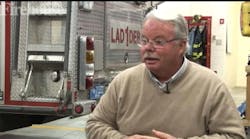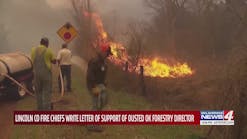It took a minute, a very long minute, for Retired District Fire Chief Mike McNamee to make a decision he would never forget, nor never regret.
An aggressive, veteran firefighter had just battled his way back out of the Worcester Cold Storage and Warehouse Co. building that was now becoming well involved and untenable. He had the stuffing knocked out of him, his coat was steaming. He pulled his mask off and gave McNamee, the incident commander, a report.
“It’s bad in there,” the lieutenant said, reporting zero visibility with thick black smoke that made any search and rescue impossible. McNamee considered the words of his trusted brother.
He knew there were six of his men inside. He knew their fate. He thought for a minute, a full minute he says, and made an announcement.
“Look, it’s over,” he told the crews packed up ready to go in to get their brothers. “It’s over. No more.”
In disbelief, they started yelling at the chief on that chilly Dec. 3, 1999 night.
“They were mad, they were yelling at me,” said McNamee. “What do you mean we’re not going up? What are you talking about? You can’t do that.”
McNamee steeled himself, braced his feet on the door jamb and put his hands over his head to more fully block the entrance. He raised his voice and bellowed, “Look, we’ve already lost six, we’re not going to lose any more.”
The firefighters went silent, and stepped back.
“It was like someone gave them a gut punch, the whole bunch,” McNamee said. “Their shoulders slumped, their heads went down. And then, I said, now let’s go outside and set up the defense. …You know that’s when we kind of knew we failed. We failed that night. … The building kicked our butts big time. The building won.”
On the eve of the 10th Anniversary of the fire, McNamee sat in the apparatus bays of the brand new Franklin Street fire station, built on the site of the destroyed building, the hallowed ground of the six fallen brothers. About 10 feet to his left, the remains of Jerry Lucey were recovered and 10 feet to his right, Paul Brotherton was found.
McNamee doesn’t like to be called a hero and doesn’t react well to the suggestion that he might be one, for physically barring the door that night.
“I love this job and I just tried to make the right decisions,” he said demurely. …It was a very, very clear decision, one that I have never second-guessed. One that I’m very glad I made because the number would have been higher than six. I don’t have a doubt about it.”
He said there were a lot of firefighters who got tangled in telecommunication wires that fell from the ceiling like deadly nets, pinning them to the floor. Other firefighters were running out of air as they searched for exits in dark, smoke-filled rooms with flush walls made out of cork with flush D-ring recessed hardware.
“Our numbers could have been 12 to 15 that almost did not get out,” he said, thankful that it was almost and not actually.
After the fire, McNamee said some of those same guys chomping at the bit to go in and look for their lost brothers came to him with the same message: “You did the right thing. We’re glad you did what you did. Thanks for doing it.”
The decision, however courageous or heroic it might be, McNamee said comes down to experience and the lessons learned the hard way. He had already been at the job 27 years when the fire occurred and had long been a technical student of fire science. He knew what he had to do.
“When I took that full minute, I really thought it through very clearly,” McNamee said. Everybody knows the risk/benefit analysis and that’s about what I did.”
In that minute he mulled the risk and decided, it was all loss, nothing positive would come of sending more men inside.
“The sad part is, if the original two didn’t get lost in there, I would have emptied the building and gone to defensive long before,” he said. “But once you’re missing to people, you can’t leave, you have to do everything you can.”
McNamee retired just last month and during the intervening years, he said the department has made a lot of changes to improve firefighter safety through a combination of training and the purchase of new technology, including thermal imaging cameras, additional radios and firefighter tracking devices.
The training has been extensive and shared by Worcester to firefighters all across the country and Canada. The fact that the world looked to Worcester for knowledge helped buoy the department that had been shaken, but not broken.
As for himself, he acknowledges that, “The dark clouds circled” for him a bit after the tragic fire, but he took full advantage of all the critical incident stress management. He jokes that he has a PhD. on the topic, but he did it for his wife and family. He knew he had to keep himself well.
Nevertheless, this time of year takes a little piece out of the retired chief. He said he gets “a little out of step,” sometimes less, some times more.
“But you can’t forget them,” he said.
And even though he just retired after 37 years, he still loved the job.
“I left this place smiling,” he said. “I wasn’t bitter. I wasn’t angry. I left here happy. It was very good to me, I’d do it again. …I always tried to remember where I came from and treat people they way you want to be treated, that’s all. And know your business. When anybody new came on my shift, I would just say, ‘I’ve got six words for you: know your job, do your job. That’s it. Simple.’”






